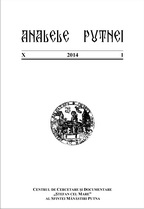Ciceul în 1499: de la ingerinţa voievodului Transilvaniei în relaţiile româno-ungare la „cuibul de nelegiuiţi” din imaginaţia istoricilor
Ciceu in 1499: from the Interference of the Voivode of Transylvania in the Romanian-Hungarian Relations to the “Hotbed of Outlaws”
Author(s): Marius DiaconescuSubject(s): History
Published by: Centrul de cercetare şi documentare ŞTEFAN CEL MARE
Keywords: Ciceu; Stephen the Great; voivode of Transylvania; Moldavia; Wallachia; villains; Saxons; Jew; trial
Summary/Abstract: Prompted by the assertion that the estate of the castle of Ciceu was considered in the letter exchanges between the king of Hungary and the voivode of Transylvania as a hotbed of criminality for the whole of Transylvania and a real nest of villains, the author analyzed the document in question and did not find any element to confirm the respective statements. The document is a letter from King Vladislas II of Hungary to the voivode of Transylvania, Peter Szentgyörgy, in which the monarch replies punctually to previous letters in which the voivode had raised various questions. Thus the king fails to fulfill the voivode’s request for the transcripts of the letters of agreement with the rulers of Moldavia and Wallachia, and explains instead what these contained. He informs that he had awarded the estates confiscated from Benedict Dedácsi to the voivode’s familiares. He warns the voivode that he had to respect the autonomy of the Saxon courts and was not to judge the suit between the inhabitants of Sibiu and a certain Jew from Poland, also explaining the trial procedures specific to the cases involving the Saxons. He asks the voivode to allow the export of oat toward Baia Mare, as this was necessary for the exploitation of the royal mines. The Saxons of Orăştie were to bring before the royal court their suit against the owner of the estate of Hunedoara for the disputed mountains. The voivode had to clarify with the nobles from the counties of Dăbâca and Inner Solnoc the issue of the fugitive serfs from the noble’s lands to those of the Treasury, to the effect that those serfs who had already settled on other estates should remain there, while future migrations should be prohibited. The voivode had to pay attention to not disturb the nobles when he was to eradicate the villains on the estates of Ciceu, Almaşu, and Unguraş. A final word concerns his salary, of which he was to receive details from the royal treasurer. The analysis of other sources suggests that the voivode of Transylvania, Peter Szentgyörgy, who was appointed to this position sometime before October 1, 1498 became interested in the Transylvanian estates of the Romanian rulers. Thus he requested from the king the transcripts of the agreements concluded with them. These letters were in fact the acts of homage of the rulers of the Romanian Lands to the king of Hungary. Encouraged by the attitude of the voivode, some nobles from Transylvania raised claims to parts of the estate of Ciceu in 1499–1500. Concerning the villains that had to be eradicated, the author emphasizes that this was not just about those on the estate of Ciceu, which belonged to Stephen the Great, but also about those on the estate of Almaşu, in the possession of Mathias Pongrác, and that of Unguraş, in possession of the bishop of Oradea. The preserved documents indicate that certain conflicts arose between the inhabitants of the said estates and the neighboring nobles. At any rate, one cannot state that Ciceu, a castl
Journal: Analele Putnei
- Issue Year: 2014
- Issue No: 1
- Page Range: 165-179
- Page Count: 15
- Content File-PDF

